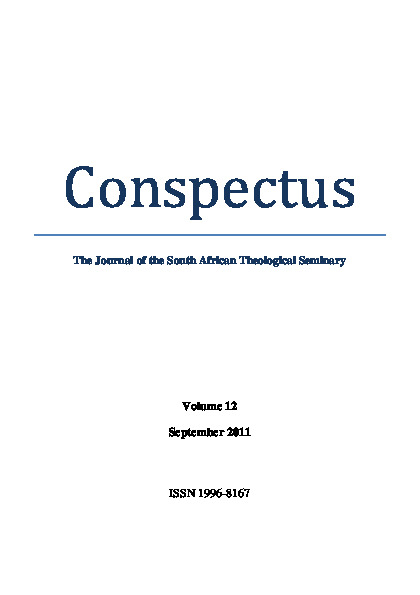Volume 12
September 2011
Paradox and the Centrality of the Doctrine of God in Hermeneutics
This essay examines the legitimacy of paradox as a valid hermeneutical category.The arguments of theologians and authors on both sides of the debate are examined and critiqued.Importantly, the way that R L Reymond applies his anti-paradox principle in his systematic theology is evaluated in order to provide insight into the debate.
Captured by Christ Jesus
Paul’s autobiographical account of his Christian existence in Philippians 3 has been a source of immense encouragement to believers, as well as a subject of extensive academic debate. An aspect of this debate is the group of grammatical conceptual and theological problems presented by his transitional disclaimer in Philippians
Mindfulness and the Brain
The aim in this paper is to critique some aspects of neuro-scientific studies on mindfulness and mindful practices. Firstly, because of the often mistaken assumption that it is something totally new; its roots in fact lie in religious and philosophical views which are the antithesis of a Christian worldview.
Jesus’ Resurrection and the Nature of the Believer’s Resurrection Body
This journal article undertakes a biblical and theological analysis of 1 Corinthians 15, in order to discern what Paul had to say about Jesus’ resurrection and the nature of the believer’s resurrection body The essay first considers Paul’s theology ithin the context of Second Temple Judaism and Adamic motifs in ancient Jewish literature.
A Biblical-Theological Analysis of Matthew
This essay conducts a biblical-theological analysis of Matthew 6:19–34 to clarify what it teaches about the relationship between the Christian disciple and money. One major finding is that Jesus presents money as a rival god that challenges for the allegiance that rightly belongs to the Lord.
Integrated Theology: A Key to Training Thinking Practitioners
The thesis of this article is that the dominant models of theology in universities and seminaries are too fragmented to serve the purpose of training thinking practitioners for the church. The separation and isolation of the theological sub-disciplines is better suited to the needs and goals of a research university than to the objectives of a seminary or to the needs of the church of he Lord Jesus Christ.
Review of Collins, The Language of God
Undoubtedly, the credentials of Francis Collins are impressive. As the former head of the Human Genome Project, he is one of the orld’s leading geneticists. He is also a Christian with strong a convictions that theistic evolution is the best explanation of the creation aspects of the Bible. Not ithstanding y criti ue of a nu ber of Collins’ clai s The Language of God will certainly challenge the intellectually honest reader.
The Creation and the Fall of Adam and Eve
The purpose of this paper is to attempt to explain the deeper meaning determined in the reference to Adam and Eve, the two trees, and the serpent found in Genesis chapters 1 and 2. The intention is to demonstrate that these characters and events were not mythological anecdotes, but concrete descriptions of factual events and characters, which have a deeper and added significance and spiritual importance now
Cheating at Solitaire
‘Cheating at Solitaire’ deals with self-deception and attempts to answer questions such as, what is self-deception, how does moral reasoning go wrong, what is the relationship between self-deception and delusion, and how can self-deception be prevented? The intent is to make pastors and counsellors aware of the danger of self-deception and its potential negative influence on ministry and mental wellbeing.
An Evaluation of Contemporary Challenges to Evangelical Orthodoxy Posed by Toon’s Four Basic Types of Theology
Contemporary theology is a maze of conflicting beliefs and approaches. The present situation poses unique challenges to evangelical orthodoxy. Using typology (as developed by social scientists), this article surveys a limited variety of intellectual constructs around which the greater variety of contemporary theologies are built.
Review of Hixson, Getting the Gospel Wrong
At the time of the publication of this book, Hixson served as the executive director of Free Grace Alliance. He teaches theology at Grace School of Theology in The Woodlands, Texas, and Free Grace Seminary in Atlanta, Georgia. Hixson holds a Ph.D. from Baptist Bible Seminary, a Th.M. from Dallas Theological Seminary, and a B.A. from Houston Baptist University.
Review of Craig and Meister, God is Good, God is Great
For the proper understanding of the milieu of this book, it is important to introduce briefly a new atheistic movement. The contemporary context of apologetics was redefined in 004 by Richard Da kins’ book, The God Delusion. It marked the commencement of an atheistic movement often referred to as the New Atheism.

